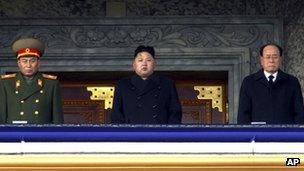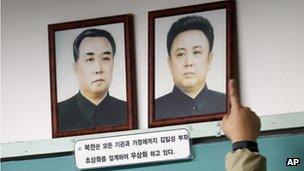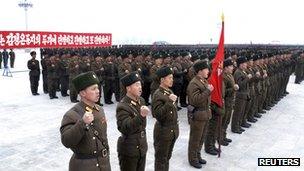Will North Korea change under Kim Jong-un?
- Published

Kim Jong-un has been portrayed as a worthy successor by state-controlled media
North Korea's new leader, Kim Jong-un, has been in place for the month since the death of his father was announced.
In that time, the country's tightly-controlled media machine has lavished him with praise, calling him a "genius" and a "brilliant" military strategist. Its political structure has also garlanded him with formal titles every bit as extravagant.
But amid all the titles and the propaganda, what can we learn about North Korea's future direction under its new leader?
In the weeks since Kim Jong-un has been in power, most telling is the way he remains overshadowed by his late father and grandfather.
Despite a flood of propaganda aimed at boosting the image of the inexperienced young leader, it is still his father who dominates North Korea's important New Year message. Kim Jong-il's name appears dozens of times in the script - far more than his son's.
"We should staunchly defend the revolutionary heritage bequeathed by Kim Jong-il, whatever the storm and stress," it said. "Our party... will make no slightest vacillation and concession in implementing the instructions and policies he laid out in his lifetime and... will allow no change in this process."
It even goes so far as to spell out the core message explicitly: "Kim Jong-un is precisely the great Kim Jong-il."
Dr Gyeong-seob Oh of South Korea's Sejong Institute said that this is a clear indication from the North Korean regime that the new leader is his father's heir "in position, revolutionary ideas and policies".
In other words, expect no change.
In fact, North Korea has already said as much. Shortly after Kim Jong-il's death last month, it issued a scornful statement via state media, warning that "foolish politicians around the world, including in South Korea, should not expect any changes from us".
Small change
But some of those watching North Korea over the past few weeks did pick up some small signs of possible shifts within the regime.

Kim Jong-un has to live up to the rule of his popular grandfather Kim Il-sung (left) and father Kim Jong-il
Walking behind Kim Jong-un during his father's funeral procession were equal numbers of military and civilian big-wigs. One of the most prominent, his uncle Jang Song-thaek, is believed by some to perhaps be the most open to reform and is now seen as playing a key role in supporting the young leader.
Dr John Swenson-Wright, an Asian affairs specialist at Cambridge University, describes Jang Song-thaek as someone who "may be an influential voice in favour of economic liberalisation and greater openness".
He added that there are signs "that some in the Chinese leadership see Jang as a constructive voice for reforms that echo the modernisation that the Chinese economy went through in the 1970s and 1980s".
Kim Jong-un's youth - and his two years at school in Europe - have also fuelled speculation over whether he will have a different perspective on government and whether those around him will share his views.
Dr Swenson-Wright believes much will depend on the attitude of a younger generation of elite - people in their 20s and 30s - who will have "a much wider awareness of the outside world than the old elite".
"Anecdotal accounts from Western non-governmental groups suggest that the children of the DPRK 's [North Korea's] political elite increasingly see training in business and the possibility of access to Western education as the preferred route rather than a traditional career in institutional politics," he said.
And the way in which the young Kim has been presented to his people has also fuelled speculation over whether the country is returning to an earlier style of government.
North Korea's official media has made much of Kim Jong-un's physical resemblance to his grandfather, seen as the country's most popular leader.
'Military first'
But Dr Brian Myers, professor of International Studies at Dongseo University in Busan, believes the link to North Korea's founding father is only skin-deep.
"Many people believed that because he looked like Kim Il-sung, and because the official media were making so much of that resemblance, that he was going to return to Kim Il-sung's style of running the country with equal emphasis on both economic and military affairs," said Dr Myers. "But we really haven't seen that."
What we are seeing, he added, is "Kim Il-sung's face on Kim Jong-il's policies".
Kim Jong-il's core policy was "songun" or "military first".
Military leaders publicly pledged their allegiance to Kim Jong-un at his father's memorial service, before hundreds of thousands of their own people and the eyes of the world.
A state TV documentary aired on Kim Jong-un's birthday a week later showed the young successor in various military poses - driving a tank, inspecting the troops and pictured with military officials during a missile test several years ago.
One of the first official visits he made as leader was to a highly-revered tank division of the North Korean army.
Dr Myers said that these are all images that are meant to show Kim Jong-un as a "military first" leader.
"He's not associating himself directly with economic affairs, which makes good sense politically speaking, because the regime doesn't know whether they'll be able to make much progress on that," Dr Myers said.
North Korea has faced severe economic problems since Kim Jong-il took power in 1994.
"The whole benefit of the 'military first' policy for the regime was that it could disassociate itself from economic policy," Dr Myers explained.

Kim Jung-un is expected to be a "military first" leader
The other benefit - at least for now - is that it allows a young and relatively unknown leader to slip swiftly and neatly into his father's shoes.
Dr Gyeong-sob Oh says the politically inexperienced Kim Jong-un has "chosen to follow in the footsteps of his father's policies because he is simply not prepared to propose new (ones)".
And neither, he believes, are the more established heads around him, adding that doing so could result in "elimination".
The lack of new ideas or policies in the country's New Year's message, he concludes, is the result of a "strategic compromise" by Kim Jong-un and the governing elite.
The good news for South Korea and its allies though, according to Korean analyst Haksoon Paik, is that "since stabilisation is at the top of Kim Jong-un's agenda, unless South Korea and the US pose a threat to or provoke North Korea, it is not likely that North Korea will provoke first".
'Very stable'
Government officials in South Korea openly agree.
Soojin Park, deputy spokeswoman for the Unification Ministry, which deals with inter-Korean affairs, said that the succession appears to be "very stable and well-prepared" so far.
She said the government understands "that the North might need some time to settle things internally" and will not "respond to every remark or statement that the North releases".
"Just because the North has criticised the [South Korean] government, it doesn't mean they won't come out for dialogue," Ms Park said.
As in the past, words and symbols may tell one kind of story here on the Korean Peninsula, but it is actions that count.